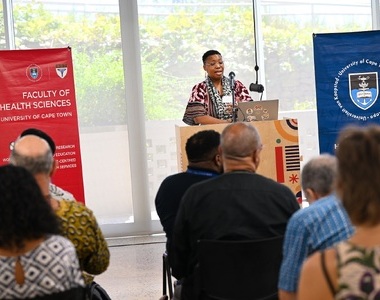Royal Society medal for ‘exceptional young researcher’
11 October 2019 | Story Helen Swingler. Photo Robyn Walker. Read time 5 min.
Dr Dyllon Randall, of the University of Cape Town’s (UCT) Department of Civil Engineering, has added the 2020 Royal Society of South Africa Meiring Naud é Medal to his tally of honours.
The Royal Society’s “junior medal” is named after Stefan Meiring Naudé, president of the society from 1960 to 1961. It is awarded to outstanding early career scientists who have the potential and track record to become scientific leaders.
The senior lecturer in water quality engineering was described as “an exceptional young researcher”. He was singled out for projects that have resulted in groundbreaking research and numerous international and national awards. In addition, the adjudicators recognised his contribution to science in the country and his passion for sharing his knowledge and expertise.
“Great honour”
“This award is a great honour for the work we are doing,” said Randall.
“I have been very blessed with amazing students who have helped reshape our view of human urine, and sanitation in general. We will continue to develop other innovative solutions to the most pressing issues facing society.”
The focus of Randall’s work has always been resource recovery from wastewaters and, more recently, sustainable sanitation. One of the projects cited links to Cape Town’s recent drought, when on “day zero”, the city’s taps were predicted to run dry. Picking up the challenge, Randall and his team developed the worldʼs first fertiliser-producing urinal that uses no water and does not need to be connected to a conventional sewerage line.
The citation for the medal acknowledges other groundbreaking work: “His outstanding scholarly work resulted in him being awarded the 2019 Warner Prize by the global Institution of Chemical Engineers for ‘exceptional research in the field of sustainable sanitation systems, for notably challenging the status quo and for disseminating findings to the broader public and scientific community’.”
Strong scientific record
It also mentions Randall’s Next Einstein Forum (NEF) Fellowship, recognising his “strong scientific record and potential for leadership”.
“We will continue to develop other innovative solutions to the most pressing issues facing society.”
Earlier this year he received the prestigious Future Leaders – African Independent Research (FLAIR) Fellowship from the Royal Society, made to talented African researchers who have the potential to become leaders in their fields.
His urine research helped his team win first prize in the Clean Water & Sanitation track as well as the Global Scalability Award at the UNLEASH 2018 global innovation lab, which explored the creation of real, scalable solutions to the United Nationsʼ Sustainable Development Goals.
His supervised research work also won the 2017 (inaugural competition) and 2018 Greenovate Award for sustainable building innovations, the best civil engineering undergraduate research thesis in South Africa for 2018 and the second-best thesis in 2019.
Recently, one of Randall’s students, Hlumelo Marepula, won the first Cape Town Falling Walls Lab competition and will compete in the global finals in Berlin later in the year. In 2014 Randall himself was chosen as one of three global Falling Walls Young Innovators.
Urine bio-brick
But his team’s work is not confined to the research environment; it resulted in the installation of a urine collection system in a new R600-million commercial building in Pretoria, the first of its kind in South Africa. This project was awarded an Innovation Star rating by the Green Building Council of South Africa.
But perhaps his best-known innovation is the world’s first bio-brick grown from human urine. This work received a phenomenal response – the story was picked up by 142 news outlets in 23 countries, with a potential media reach of 248 million people in the first five days after the announcement was made.
The final commendation reads: “There is no doubt that Dr Randall has made significant independent contributions to his field. His work is also already having a positive impact on society.”
 This work is licensed under a Creative Commons Attribution-NoDerivatives 4.0 International License.
This work is licensed under a Creative Commons Attribution-NoDerivatives 4.0 International License.
Please view the republishing articles page for more information.






























































































































































































































































































































































































































































